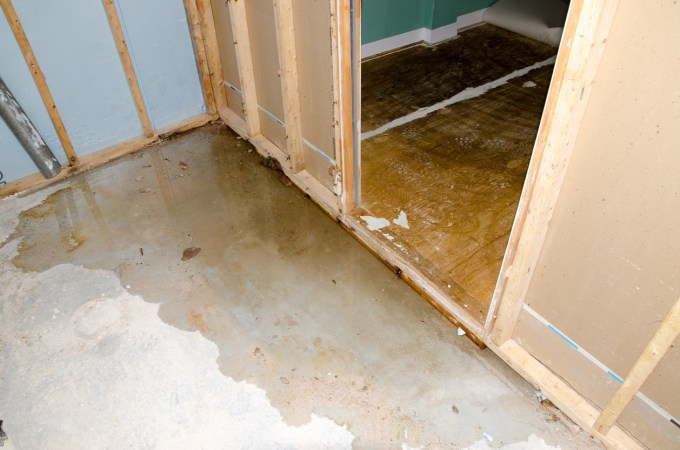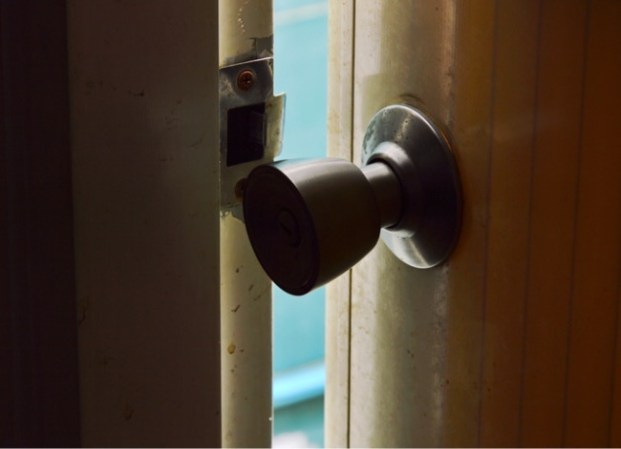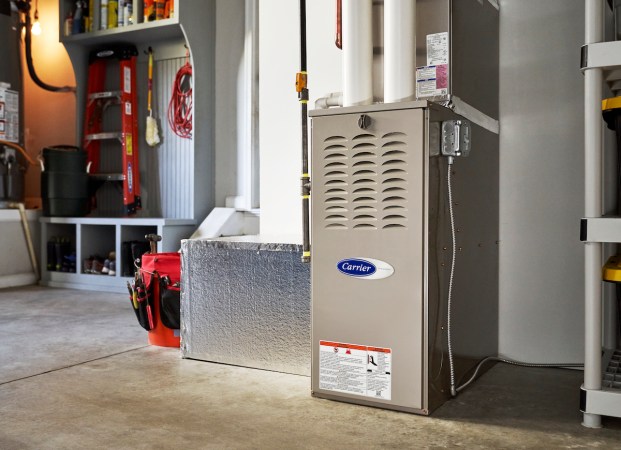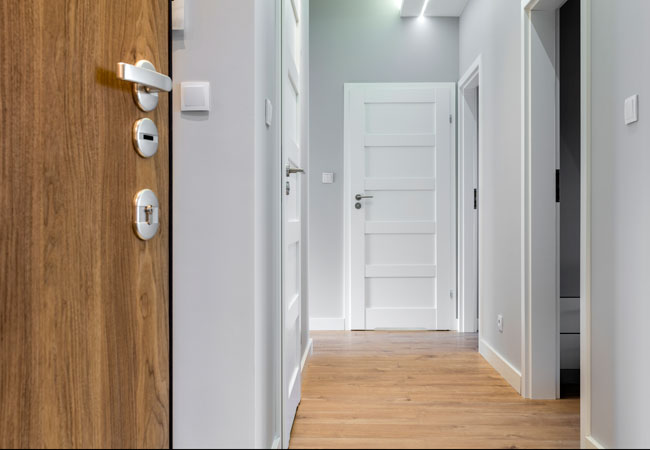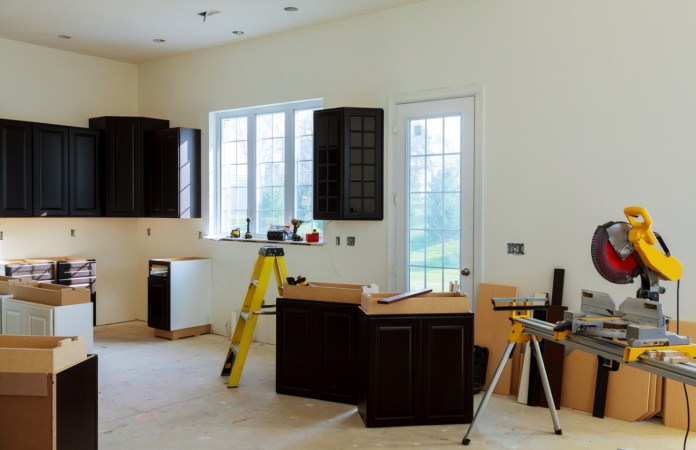We may earn revenue from the products available on this page and participate in affiliate programs. Learn More ›
What You Need to Know
- Hiring a handyman costs around $60 to $65 per hour, depending on experience and location.
- A handyman can do a variety of home projects, including repairs, small plumbing and electrical jobs, and outdoor chores.
- Handymen can often help with emergency situations such as broken doors or windows, plumbing leaks, and fallen tree branches.
- Before hiring, homeowners will want to ask friends for recommendations, read online reviews, and check their state’s handyman licensing requirements.
Hiring the Best Handyman Near Me
Many household repairs and upgrades aren’t huge jobs, but in the business of everyday life, they can stack up when there’s just not enough time to tackle them or when the idea of multiple trips to the home center to buy different tools and supplies is overwhelming. Even the most committed DIYer can look at a project and think, “This may be beyond my skill level. Do I need a handyman near me?”
A good handyman has the experience, tools, and know-how to safely tackle a wide range of home projects. Hiring a handyman often means paying someone to do work you might feel you could handle on your own—but in many cases, hiring the best handyman in your area could actually save money in the long run. In both scenarios, you’ll likely have to pay for materials, but purchasing tools you’ll only use for one project can get expensive, as can errors (and repairing them).
Cost of the Handyman Near Me
The average cost of hiring an independent handyman is about $60 to $65 per hour nationally, although local rates may be higher or lower. A handyman who is employed by a larger company will average closer to $125 per hour. The total you can expect to pay for a job will depend on the size: Small jobs that don’t require a lot of tools can be as relatively inexpensive as $60 to $75, while larger jobs or those that will take several days can run as high as $1,000. Some handymen have a set or flat rate for certain jobs, such as installing a railing, rehanging a door, or hanging light fixtures. This can be a cost saver over an hourly rate, especially if you’re aware that the job might be complicated: Installing a toilet in an older bathroom where nothing is square or level can present challenges that make the job take longer to be completed than average. Jobs that require a permit will likely be more costly if the handyman will be acquiring it for you.
Regardless of whether the handyman is charging a flat rate or by the hour, it’s important to make sure you’re aware of whether the contract covers materials for the job and whether there are any additional associated costs, such as the cost of a permit.
It’s generally unwise to choose the least-expensive handyman available; the best handyman near you will be experienced, licensed, and insured, and will be worth paying a little more for.
Common Issues a Handyman Near Me Can Fix
Handymen can tackle myriad indoor and outdoor problems. Indoor repairs, installations, and basic plumbing and electrical change-outs are well within a good handyman’s purview. Outdoors, handymen can repair cracks, breaks, and tears; install doors; and deal with the havoc nature wreaks on homes and yards.
Common problems a handyman can address include:
- Home repairs: A handyman can repair holes in drywall, tackle small paint jobs and touch-ups, and perform deck repair.
Installation and assembly: The shelving unit you picked may be nothing but a pile of boards and screws to you, but a handyman can assemble the pieces in no time in addition to assembling other small pieces of furniture. Other jobs that require specific know-how, such as mounting televisions on the wall, hanging shelves, installing shades, and updating hardware can also be jobs for a handyman. - Small plumbing and electrical jobs: While big jobs (usually anything that requires moving existing pipes or wiring or running new lines) should be handled by licensed plumbers and electricians, an appropriately licensed handyman can replace electrical outlets and switches, hang light fixtures and ceiling fans, and install garbage disposals, bathroom plumbing, and electrical fixtures.
- Outdoor chores: Stay off your rickety ladder; let a handyman clean and repair gutters in addition to handling fence, deck, and patio repairs; driveway sealing; and cutting and removing fallen tree branches.
Issues best left to other professionals include major renovations or additions; roof repair; adding electrical or plumbing lines, breakers, and shutoffs to the home; and larger projects that will require multiple workers with different specialties to complete.
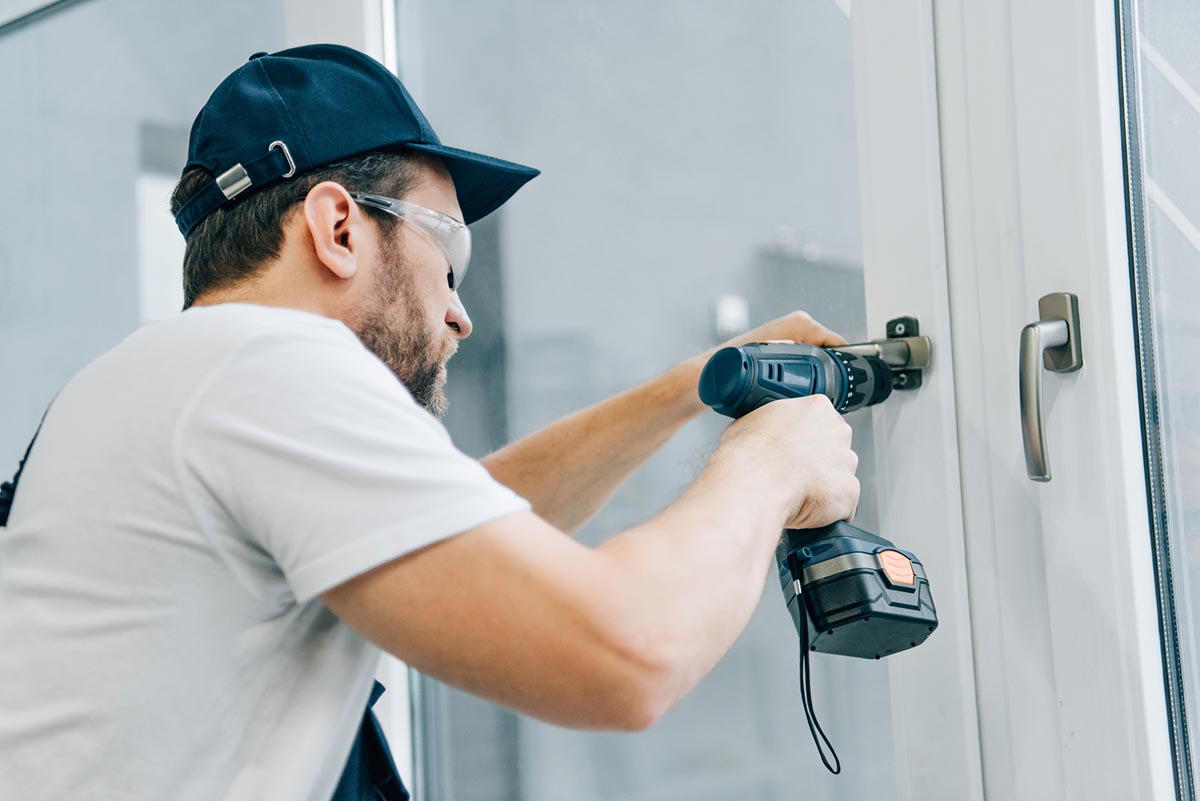
Do I Need a Handyman Near Me?
If you’re not skilled in home repair, don’t have the tools or time, or simply prefer not to do the tasks yourself, hiring a handyman is an easy decision. However, for those who are inclined to handle these tasks on their own, choosing when to hire help can be more difficult. When do you really need to hire a handyman?
Emergencies
Some repairs can’t wait. Homeowners may be able to perform a quick fix but will require a professional with the necessary experience to complete the repair and ensure the safety and security of the home.
- Broken windows or doors: Broken windows and doors leave a home, its contents, and its residents unsecured and require prompt repair. A handyman can either repair them immediately or help secure them temporarily until a permanent fix can be completed.
- Major ceiling, roof, or plumbing leaks: While these emergencies will eventually require a plumber or roofer, a handyman can help temporarily stop and secure the leak and assess the repairs that will be needed.
- Fallen tree branches threatening the home: A handyman will have the necessary safety and cutting equipment to cut up limbs that are unstable or are resting against your home. For larger limbs or those still lodged in the tree, an arborist or tree surgeon is preferable, but a handyman can take care of most tree limbs that are on the ground or leaning on the house.
- Wobbly or unseated railings: Railings that are unstable are an immediate hazard and liability to residents, guests, and service people and need to be repaired immediately. Residents can tape off the area to prevent anyone from grabbing hold of an unsteady railing in the meantime, but the repair should be made quickly. Experienced homeowners can reanchor and repair interior railings, but exterior railings may require more expertise and a permit.
- Clogged gutters before a storm: Major roof leaks can lead to extensive damage and expensive repairs inside and outside the home. If heavy rain is expected and the gutters are full, a handyman can clear them to prevent the damage instead of fixing them after the storm.
Nonemergencies
Many other small home repairs and upgrades can be handled with less urgency by a skilled homeowner or a professional. Jobs requiring specialized tools that you may not own or be less familiar with using, for example, can be dangerous for first-timers. In addition, projects that require permits or inspection or those that are a result of damage are best left to someone with more professional experience. A handyman knows what to look for when completing a repair that could lead to problems further down the road and can address the concerns proactively.
Other Considerations
There are a number of benefits to hiring a handyman to complete projects and repairs around the house.
- Time: Most homeowners underestimate the amount of time it will take to research, prepare, complete, and clean up from a project. If the time isn’t available, off-loading the project to a professional can be a good choice.
- Tools: Handymen tend to already own the tools needed for most jobs—they use them for multiple tasks. Homeowners who purchase tools for a single project are spending money for items that may just collect dust in the garage for years after the project is complete.
- Professional-grade finish: Homeowners may be able to complete simple projects after watching videos and reading instructions, but for more complicated jobs, the finished project may look unpolished. Handymen have done these projects multiple times before, so they know what to watch out for and how to get the clean, professional finish that a home deserves.

DIY vs. Hiring a Professional Handyman Near Me
When considering whether to hire a handyman, the most common considerations are skill and cost. Sometimes homeowners can take on projects themselves and save some money. Cosmetic upgrades such as painting and refinishing furniture and walls, changing hardware, making small repairs, and even installing basic flooring are tasks that many residents can take on, especially with the proper research and tools. Some experienced homeowners may have the knowledge and skill set to tackle minor electrical and plumbing repairs and installations.
But even if you’re not writing a check, there is a cost to the DIY approach: Repeated trips to the home improvement store can result in purchases made in error that can’t be returned, and “try it and see” attempts can lead to more patch-up work. In addition, even with careful research, an inexperienced homeowner may be able to complete the project, but as a first-timer, the finish will look less polished and professional than the work an experienced handyman would produce. The most valuable commodities in any home project are time and safety. DIY requires research, planning, purchasing, prep, completion of the actual job, and cleanup. It’s likely that, unless the homeowner really enjoys the work and does it often, hiring a handyman may be less costly than the time spent doing it yourself. For larger jobs, those requiring specialized tools, and those requiring permits and inspection, homeowners can save time, money, and hassle by hiring a handyman with more experience and a stock of materials and tools.
In general, it’s a good idea to call in a professional if any of the following apply:
- A safety risk is present, either because of the work that needs to be done or the homeowner’s inexperience.
- Specialized or unfamiliar tools are needed to complete the job.
- Unfamiliar odors or sounds are present without a clear source.
- The job will require a permit and inspection; completing these jobs without a professional could devalue the home at the time of sale.
- The job has the potential to damage the home or home systems.
- The homeowner doesn’t have the time or experience to complete the job.
How to Find a Reputable Handyman Near Me
Those seeking a reputable handyman near them can find posts and advertisements everywhere: bulletin boards at the grocery store, neighborhood groups online, neighbors and coworkers—and these are great places to start. Responsible homeowners, however, won’t just hire someone based on word of mouth. Licensing requirements for handymen vary from state to state with very little consistency, which can make it difficult to figure out who is reputable and who is not. A handyman is someone who will have access to your home, so it’s important to make sure you’ve done your research. The first step after gathering recommendations is to check your state’s licensing requirements so you know what to ask for.
- Check your state’s licensing requirements for licensing handymen. Some states only require licensing for certain types of jobs or for projects costing over a certain amount.
- Ask friends, neighbors, and community groups for recommendations and experiences. Choosing the right handyman isn’t just a matter of qualifications; homeowners need to be comfortable with the professional they’re letting into their home.
- Local realtors can be excellent sources: Because they often deal with repairs that need to be made before a sale, they tend to know many of the local handymen by reputation and experience.
- Use online tools to ballpark how much the work should cost in your area.
- Once you’ve identified potential candidates, secure quotes for the work from several of them in writing. This will help create a sense of what the extremes are in terms of price, and it may help you understand each handyman’s style based on how they propose to do the work and their time frame.
- Prepare to pay a deposit on the project, especially if the handyman will need to acquire supplies, but it is not advised to pay for the entire job up front.
Questions to Ask Your Local Handyman
Trusting someone else to work on your home is a big leap. In order to feel sure you’ve made the right choice, it’s important to ask questions before, during, and after the project so you know what to expect and what the plan is if it goes awry.
Before hiring the handyman:
- Have you done this type of work before?
- Can I see your compliance with state licensing requirements? What kind of insurance do you have?
- Can I see photographs of similar work you’ve completed?
- Do you have references I can contact?
- What problems might crop up with this kind of job? Can you estimate how much the additional work might cost?
- What is your procedure if you and I disagree on a change or added expense?
- If a problem arises that is beyond your areas of licensing or expertise, do you have other professionals you work with, and am I able to select my own professional if I prefer to?
- Will you be the only person working on the project, or do you have partners?
- Will you provide a timeline and estimate in writing?
- What are the methods of payment you accept, and what is the structure of the payments?
- Do you offer a guarantee of the work? What is included in the guarantee, and how long does it last?
During the project:
- What do you need from me to ensure a smooth process?
- If an unexpected problem crops up during the job:
- How will this be fixed? What additional costs are expected?
- If the problem seems larger than the handyman’s experience or licensing: Should I schedule an additional professional to come work on the project, or will you facilitate that?
After the project is complete:
- Where would it be most useful for me to leave a review? Most handymen know where their business comes from and would be thrilled to have you leave positive feedback for a job well done.
- Can you provide a receipt showing that the job is complete and paid in full?
FAQs
Hiring a handyman should save time, money, and stress—but that works only if the hiring process doesn’t add those things back into the equation. Here are the answers to some frequently asked questions to help guide the decision.
The trick to finding a good local handyman is to combine recommendations from friends, neighbors, and service providers with your own research on the project and ask careful questions about a candidate’s experience and policies. Make sure you have answers to all of the questions and that you feel comfortable with the handyman: After all, this is a person who will be working in and on your home, so recommendations, research, and gut feelings go a long way.
A handyman’s daily rate depends a lot on the market in which you live, the size of the job at hand, and whether the job was priced out by the hour or at a flat rate. At the average $65 per hour, a handyman could make $600 to $700 for a long day’s work, but completing a job priced at $1,000 in one day would result in a higher per-hour rate. Handymen in affluent markets may cost more per day than in other areas, while saturated markets might mean a lower paycheck.
Most handymen can technically replace an electrical outlet. The question is whether or not you want them to. Licensing laws for handymen and for electrical work differ state by state. A handyman near you who is licensed to do electrical work will either have the license available for display or your state will have the electrical qualification noted on the handyman’s license. Electrical work can cause too much damage to your home if completed improperly, and you may not want to risk hiring a handyman who can’t confirm that he is licensed to do electrical work.
This varies by state and licensure requirements. Electrical codes are locally based, so it’s important that your handyman knows the codes and permit requirements. The only way to know what electrical work a handyman can legally do is by checking your state licensing standards and asking a handyman you’re considering hiring for proof of licensing. Once you’re certain that the handyman is appropriately licensed, you’ll also want to ask to see proof of insurance: Electrical work usually requires code inspection after completion, but because the work can be dangerous to the handyman and your home if not done properly, it’s critical that any handyman who is performing electrical work be fully insured.




